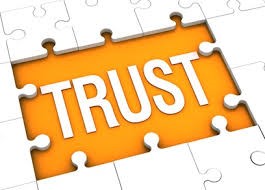
In my last post I talked about why you have to say “NO” to some donors. Sometimes they ask too much in return for their gift and it’s not plausible – nor at times, ethical – to accept the gift.
However, donors do want to know their gifts are really making a difference and that the organization and people they are in contact with can be trusted. Your job as development professional is to assure the donor they can trust you as a person and to deepen that trust by reporting back on how their investment made an impact.
That may sound simple, but 1) it’s not, and 2) from what Richard and I have witnessed it’s not part of most major gift programs operations. In other words, it’s not built into or codified as integral to the structure of most organizations’ major gift programs.
When I ask, “what is your procedure to report back on a donor’s gift,” I usually get a blank stare. When I ask an MGO, “how do you know your donors trust you,” I get a shrug and an answer like, “because I just know they like me.”
Having the trust of your donors is paramount to being successful as a major gift officer. But even more than that, it is a reflection of your organization’s brand and standing in the community in which you serve. Here are some thoughts to help you ensure that you create and have the trust of your donors:
- Make sure your organization has a systematic approach to reporting back to donors the impact of their gifts. Richard and I talk a lot about reporting impact to donors, and people nod their heads, but we need you to take it further – and as an organization, you need to embrace what that really means. If reporting back is part of the “system” of your major donor program, it will become part of your culture. A process and procedure on reporting back needs to be written down and part of how you do business as an organization. This doesn’t preclude you from being spontaneous and creative with how you report impact, but it just means that this is an expectation everyone in your organization should have.
- Respect a donor’s time. People of high wealth are generally very busy. They have very little time. If you are able to secure a meeting with a donor, you need to be prepared. In other words, don’t waste the donor’s time. It’s disrespectful. Gaining trust means doing your homework for the meeting. It means coming prepared with materials, anticipating questions from the donor, and making sure you show the donor that her time is valuable to you.
- Be on time. Related to #2, don’t be late. I’ve heard stories from donors who have agreed to a meeting and either the executive director or MGO showed up 20 minutes late. It’s rude, and it tells the donor they are not important. Conversely, I know a great MGO who will occasionally do a dry run the night before to see where the meeting is, to discover how long it will take to get there, and to make sure she knows the area so she can be on time.
- Surprise your donor with great customer service. Nothing can help you gain the trust and respect of a donor better than when you are able to exceed the donor’s expectations. Whether it be introducing the donor to someone they may help in their personal life, securing a hard-to-get ticket to the opera, or calling to say “thank you,” these little acts will endear you to your donors.
- Show the donor you know him. Let’s be honest – donors are leery of MGOs. Many donors have had bad experiences with MGOs who were only going after their money. For many donors this creates an already low trust level to begin with, as you develop your own relationship with them. Spending time to honestly get to know your donors, understand their family relationships, know their names (yes, I’ve heard horror stories) and know who they really are as a person will help you create trust.0
- Ask. Asking the donor for gifts will also create trust in the donor IF you know the donor will find joy in the project or program. If you know the donor and have listened to the donor, then you will put charitable investment opportunities in front of the donor they will want to fund. Nothing would create distrust more than asking the donor to give to a project they have no interest in. That would show the donor you do not care about him. That is how a wall will go up between you and the donor.
- Do what you said you were going to do. This is so important. If you told a donor you would follow up with some information after you met with her, please follow up. There is nothing worse to a donor than when someone says they will do something and then it never happens. Communication is vital with donors. You have to get this right. If you can create trust in the donor’s mind because they know you always follow through, you will have a long-term successful relationship with that donor.
These are seven ways you can gain and keep the trust of your donors. It’s vital in major gift fundraising that your donors know they have someone they feel comfortable with and can rely on. Your success with major donors will only happen by gaining that trust. It’s no different than your own personal relationships. Treat your donors in the same manner as those relationships, and you will be successful.
Jeff





0 Comments